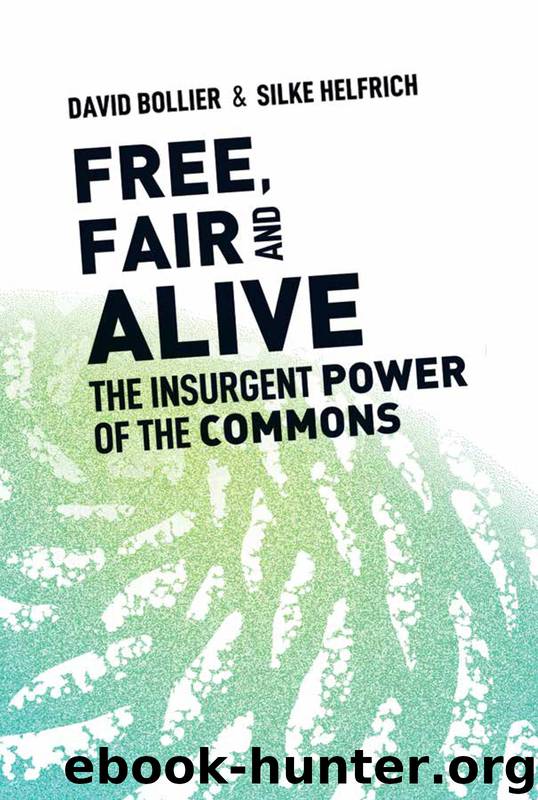Free, Fair, and Alive by David Bollier

Author:David Bollier
Language: eng
Format: epub
ISBN: 9781771423106
Publisher: New Society Publishers
Published: 2019-03-07T16:00:00+00:00
Possession is Distinct From Property
In both common law and civil law systems, possession is what happens when you personally have control over something by (sometimes literally) “sitting on it.” The Latin word sedere, from which the word “possession” derives, means “to sit.” Think about the flat you’ve rented. From a property law point of view, you may possess it as a tenant, but you don’t own it. You cannot give it away, bequeath it to your children, transfer or sell it, or, in legal terms, “alienate” it. You can sell only what you own, not what you possess.
Privileging ownership over possession has far-reaching consequences. It means that the state, in alliance with corporations and investors, becomes the champion of owners. It installs a hierarchy of subordination and capitalist social roles. This can be vividly seen in the history of states sweeping aside Indigenous rights and traditional use rights, installing in their place modern, liberal property rights and the market system.
In the late 1880s, for example, the US Government sought to eradicate Native American commoning of land by imposing a system of private ownership. The Dawes Severalty Act, which mandated this radical cultural dispossession, granted US citizenship only to those Native Americans who took up “residence separate and apart from any tribe” — i.e., to those who gave up their tribal identities and became private property holders. The prime author of the Dawes Severalty Act, Senator Henry Dawes of Massachusetts, explained that under common ownership “there is no enterprise to make your home any better than that of your neighbors. There is no selfishness, which is at the bottom of civilization.”21
On countless other occasions, European and American imperialists have repeated this pattern. They have forced Indigenous cultures to surrender their stewardship of inalienable common lands and treat their land as “private property” and tribal members as individuals. Historian E.P. Thompson described how this model was imposed on Indigenous peoples in North America, India, and the South Pacific: “Property in land required a landowner, improving the land required labor, and therefore subduing the earth required also subduing the laboring poor.” Thompson cites a Lord Goderich, who explained in 1831: “Without some division of labor, without a class of persons willing to work for wages, how can society be prevented from falling into a state of almost primitive rudeness, and how are the comforts and refinements of civilized life to be procured?”22
Once again, ownership implies a different social order and set of relationships to the earth than possession. The two are similar in that both provide clear rights of access and use, and neither is “open to all and shareable without restriction.” If you own a flat, you are entitled to sell it or give the key to the person who rents it. If you only possess a flat (because you rented it), you can still determine access rights (you have the key) but are not entitled to sell it.
As this difference suggests, possession is focused on concrete use and use value (which are critical to commoning) while property ownership is oriented toward exchange value.
Download
This site does not store any files on its server. We only index and link to content provided by other sites. Please contact the content providers to delete copyright contents if any and email us, we'll remove relevant links or contents immediately.
| Arms Control | Diplomacy |
| Security | Trades & Tariffs |
| Treaties | African |
| Asian | Australian & Oceanian |
| Canadian | Caribbean & Latin American |
| European | Middle Eastern |
| Russian & Former Soviet Union |
The Secret History by Donna Tartt(19035)
The Social Justice Warrior Handbook by Lisa De Pasquale(12183)
Thirteen Reasons Why by Jay Asher(8885)
This Is How You Lose Her by Junot Diaz(6873)
Weapons of Math Destruction by Cathy O'Neil(6261)
Zero to One by Peter Thiel(5784)
Beartown by Fredrik Backman(5734)
The Myth of the Strong Leader by Archie Brown(5495)
The Fire Next Time by James Baldwin(5428)
How Democracies Die by Steven Levitsky & Daniel Ziblatt(5211)
Promise Me, Dad by Joe Biden(5141)
Stone's Rules by Roger Stone(5080)
A Higher Loyalty: Truth, Lies, and Leadership by James Comey(4947)
100 Deadly Skills by Clint Emerson(4917)
Rise and Kill First by Ronen Bergman(4776)
Secrecy World by Jake Bernstein(4739)
The David Icke Guide to the Global Conspiracy (and how to end it) by David Icke(4697)
The Farm by Tom Rob Smith(4501)
The Doomsday Machine by Daniel Ellsberg(4482)
